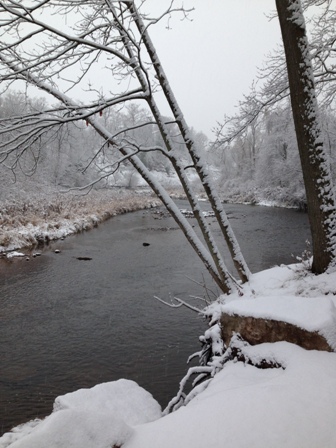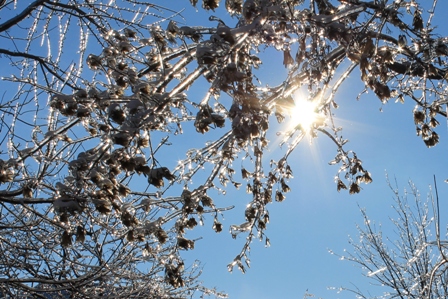This year for the first time ever I managed to stretch my growing season into October and I had bok choi and lettuce to harvest along with a few onions and some very persistent kale. Now, of course, I am not in the garden at all. The beds are mostly cleaned out and bare. The lawn has turned a dull shade of brown. The air is not cool but freezing cold. The days are short and the nights are long.
I have now come inside, content to put a fire in the fireplace and make a cup of tea and ignore the yard outside my window. Perhaps if I don’t look, it won’t be so bad and spring will come that much sooner.
Many of us are familiar with the winter season, but it may not be just in the garden. There are times for all of us when the landscape becomes bleak and the winds bitter. Seasons change and the beauty we knew has gone. Relationships have withered. Money has disappeared. We no longer remember what it was like to be in good health, to be happy, to get a good night’s sleep.
Often, when our own personal landscape becomes barren we respond as I have to my winter garden. We close the drapes, light a candle and desperately try to shut out the trouble. If I can just close my eyes tight enough, we think, it will go away. I will just wait quietly until things change.
 I have a new gardening book called, “The Winter Garden.” When I first picked it up I thought the title was an oxymoron. Here in Canada there is snow and sleet and slush in winter, not tulips and petunias. There will be no digging or blooming or harvesting come January or February.
I have a new gardening book called, “The Winter Garden.” When I first picked it up I thought the title was an oxymoron. Here in Canada there is snow and sleet and slush in winter, not tulips and petunias. There will be no digging or blooming or harvesting come January or February.
But the author of the book, Jane Bennett, wants to change my mind. While it may be true that colours change and plants become dormant, “the garden need not be forgotten in winter and simply left to await the first shoots of spring,” she says. There is still scent and texture and movement to enjoy. There is life out there, and beauty, if only I would put on my mittens and go out to explore it.
Writer Barbara Brown Taylor (I have been reading her new book, Learning to Walk in the Dark) agrees that this is true not just in the garden but also in our lives. Doubt is not something to avoid. The cold and darkness of our suffering do not disappear because we refuse to acknowledge them. We may in fact, miss the mysterious and beautiful gifts that would be ours if we only had enough courage to claim them.
Reading about winter gardens made me wonder, so I went outside this week and do you know what I found? The broad leaves of a purple cabbage. Stubborn green leaves of swiss chard held up by pink and yellow and orange stalks. Sage that is still full and fragrant. Even the mint, which looks like nothing much from the window, is blithely carrying on despite the calendar that says December.
To pause for a moment out there in my winter garden was to discover crisp air and moonlight and wind singing through the bare tree branches. Yes, it was cold and it certainly isn’t the season for sitting out on a lawn chair and reading a good book. But out there in my winter garden there was still room for wonder, for beauty, for signs of life.
 Is it possible that in those winter seasons of our soul, those times when all seems lost and God is far away, that beauty is still there? Is it possible that if I poke around a little instead of just hiding inside in my wooly sweater that I might find friendship, or nourishment, or glimpses of fresh hope?
Is it possible that in those winter seasons of our soul, those times when all seems lost and God is far away, that beauty is still there? Is it possible that if I poke around a little instead of just hiding inside in my wooly sweater that I might find friendship, or nourishment, or glimpses of fresh hope?
Perhaps you already know. But if you aren’t sure, may God bless you with the courage to get out there and may you discover that “winter garden” isn’t an oxymoron after all.

